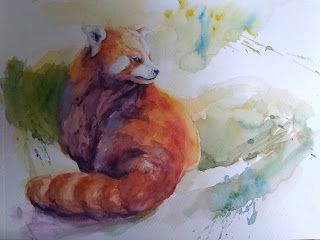Pak Wan-Suh
"Whisper"
Hesse questioned a dictum made by Wilhelm Schäfer about the poet's task: "It is not the poet's business to express what is simple significantly but what is significant simply." Reading the passage with slight uneasiness, he turned it upside down as painters do when they judge a picture: "It is not the poet's business to express what is significant simply but rather what is simple significantly." He thought that the poet's duty was not to select important things and present them to readers, but to find eternity in every trivia and revive the life from it.
While reading "Whisper", which consists of several short stories, I found Hesse's dictum resounding in this book. Pak Wan-Suh might be one of the most unpretentious storytellers who replicate the spontaneity of oral tradition. Sentences flow just like small streams in a mountain. Here is a brief of the story, 'The Last King'.
Long long time ago, there was a generous King who thought that everyone should be happy equally. So everyone was happy and King was respected. But there was one restriction, which was no one should be happier than King. One day, King encountered a young father who was a small village reader and seemed to be happier than himself. Every one in the village liked him because he was just and helpful. So, King thought his occupation made him happy, so robbed him of the position. Later King found the young man still happier than him, so took his wealth, his family and his freedom away from him one by one. But the young man sang beautiful songs even in prison and seemed to be happier than King. King who couldn't stand this brought him a drink with poison in it. The young man keeping a beautiful face, neither happy nor despairing, was willing to take the poison, saying that owing to King now he could stay with his wife. King thought the man was still happier even at this final moment. Out of jealousy, he took the poison the man was about to drink and swallowed it himself.
Hesse questioned a dictum made by Wilhelm Schäfer about the poet's task: "It is not the poet's business to express what is simple significantly but what is significant simply." Reading the passage with slight uneasiness, he turned it upside down as painters do when they judge a picture: "It is not the poet's business to express what is significant simply but rather what is simple significantly." He thought that the poet's duty was not to select important things and present them to readers, but to find eternity in every trivia and revive the life from it.
While reading "Whisper", which consists of several short stories, I found Hesse's dictum resounding in this book. Pak Wan-Suh might be one of the most unpretentious storytellers who replicate the spontaneity of oral tradition. Sentences flow just like small streams in a mountain. Here is a brief of the story, 'The Last King'.
Long long time ago, there was a generous King who thought that everyone should be happy equally. So everyone was happy and King was respected. But there was one restriction, which was no one should be happier than King. One day, King encountered a young father who was a small village reader and seemed to be happier than himself. Every one in the village liked him because he was just and helpful. So, King thought his occupation made him happy, so robbed him of the position. Later King found the young man still happier than him, so took his wealth, his family and his freedom away from him one by one. But the young man sang beautiful songs even in prison and seemed to be happier than King. King who couldn't stand this brought him a drink with poison in it. The young man keeping a beautiful face, neither happy nor despairing, was willing to take the poison, saying that owing to King now he could stay with his wife. King thought the man was still happier even at this final moment. Out of jealousy, he took the poison the man was about to drink and swallowed it himself.


Comments